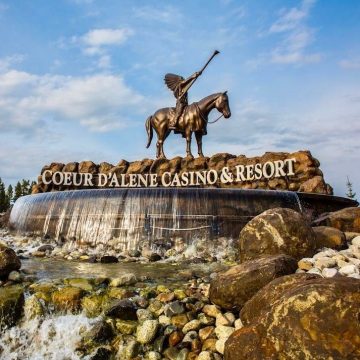
If the U.S. Supreme Court strikes down a federal ban on sports betting, the nation’s 450-plus tribal casinos could face issues launching legal sportsbooks on their reservations. Because gambling is based on sovereign reservations, issues would exist.
The Indian Gaming Regulatory Act (IGRA) treats federally-recognized Native American casinos as sovereign territory. Tribal casinos operate under a gaming compact with their adjoining state, but few compacts mentioned sports betting.
Tribal Casino Sportsbooks Are Problematic
For the Indian casinos to offer legal sports betting, they would have to amend their gaming compact with the states. Negotiations in states like Florida, New Mexico, Oklahoma, and even California have been contentious in the past. Whatever happens, negotiations would take time, allowing private casinos to get a head-start on the tribal sportsbooks.
The alternative would be for the tribal casinos to launch sportsbooks as private enterprises. The drawback to doing so would be to erode the reservation’s claim to sovereignty, because it would be acting like any other commercial enterprise.
No Lawsuits Allowed
Due to an interpretation of the 11th Amendment according to the 1996 decision, Seminole Tribe of Florida v Florida, Native American gaming interests cannot sue US states for negotiating in bad faith. Thus they are left without recourse if a state decides to bar them from delaying the launch of a sportsbook on their reservation, simply by refusing to negotiate.
244 Potential Sports Betting Operators
For that reason, 244 gaming tribes in 29 different U.S. states could face problems launching legal sports betting operations. They would have to choose between expediency for the sake of short term profits, or a long term approach which would cost money as a startup sports gambling operation. Before brand loyalty is important, those which take a long term approach could find themselves at a permanent disadvantage.
Any implementation could be troublesome for both private and tribal interests, based on how much influence each group has in their state. Often, tribes receive statewide or select-area monopolies for certain types of gaming. They might seek to secure a sports betting monopoly in their state, if Native American gaming tribes have leverage in their state. In that case, non-tribal casinos might find themselves on the outside looking in.
Connecticut Tribal Sports Betting
The relationship tribes have with the local state cannot be overstated. The Mashantucket Pequot Tribe and Mohegan Tribe of Connecticut are a good example. The tribes, which respectively own Foxwoods Casino and Mohegan Sun, have a close working relationship with the Connecticut state legislature.
Not only did Connecticut lawmakers recently approve a satellite casino for the two tribes, who’ll jointly own the casino, but lawmakers also passed a sports betting law. If the US Supreme Court strikes down the Professional and Amateur Sports Protection Act (PASPA), then the Mashantucket Pequot and Mohegan tribes will be able to open legal sportsbooks quickly.
Mohegan Sun and Foxwoods on Legal Sports Betting
Even with support from their local state, though, Mohegan Sun and Foxwoods face uncertainties. Lori Potter, a spokesperson for the Mashantucket Pequot’s Foxwoods Resort, said, “It is premature to speculate on how any such legislation might impact on our rights under IGRA, much less on the provisions.”
Most tribes do not have the same rapport Connecticut has with its local gaming tribes. For that reason, Chuck Bunnell, the chief of staff for Mohegan Sun, expressed confidence that Connecticut’s political and business leaders would embrace bookmaking operations quickly.
Bunnell added, “We have not begun those discussions in detail, but are looking forward to being a lead state.”
US States v. Native American Casinos
The same rosy picture does not exist elsewhere. The State of New Mexico currently is being sued by 5 of its tribal casino operators. The State of Florida just finished a 2-year standoff with the Seminole Tribe of Florida over banked games. In that standoff, the Seminoles threatened to stop making tax payments.
Tribes in Michigan have a contentious history with private casinos, which sometimes brings lawmakers into a dispute on one side or the other. Currently, the tribes want any sports betting laws to include a delay of 1 to 5 years for private sportsbooks, to allow the tribes to get their legal situation squared away.
In Oklahoma, the legislature and the many tribes have a history of feuding. In California, two tribal factions have a history of feuding with one another. The stories go on and on, but the one constant is the tribal casinos are going to face special obstacles to launching land-based sportsbooks, due to the usually-helpful IGRA law.















